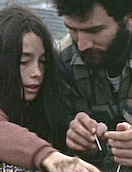Sunday, April 14, 1974.
MONTREAL MAIN. Co-written by Stephen Lack and Allan Moyle. Music by Beverly Glenn-Copeland. Co-written and directed by Frank Vitale. Running time: 88 minutes. Restricted entertainment with the B.C. Classifier's warning: coarse language and some sex.
ALONG WITH COLOURED EGGS and chocolate rabbits, the Easter weekend brought with it a new, Canadian-made feature film. Launched without the benefit of searchlights or champagne, it's nonetheless a national premiere.
Shot and being shown in 16 millimetre, Montreal Main is the work of an artist-director named Frank Vitale. Filmed on an extremely low budget, it focuses on the emotional problems of anti-heroic characters, chronicling in an almost documentary-like fashion a series of emotional turmoils in which real people become involved in tentative relationships.
In one case, that of 12-year-old Johnny (John Sutherland), the problem is innocence. In another, that of Frank (Frank Vitale), his would-be mentor, there may just be too much experience.
Vitale’s film is not so much a drama as a psycho-drama. Lacking the financial resources to hire professional actors, he called upon people he knew to play themselves in a story that might have been their own.
Although his movie is not a record of something that actually happened, it is a dramatic happening. Through the film Vitale and his friends work their way through a series of possible emotional crises.
Their story opens with Frank, a member of anglophone Montreal's inner city bohemian community, breaking up with his girlfriend Pam (Pam Marchand). At the same time, his loft-mate Bozo (Allan “Bozo” Moyle) is beginning a relationship with a suburban girl named Jackie (Jackie Holden).
Because of the tone of the community they live in, Frank and Bozo have been flirting with the idea of becoming homosexual lovers. As Bozo becomes involved with Jackie, however, Frank turns his attention to Johnny, the son of Anne and David (Anne and David Sutherland) the people with whom Jackie is staying.
Following the progress of these various flirtations is Steve (Steve Lack), quick-lipped commentator on life's vicissitudes and, apparently, a more committed member of the city's gay subculture.
When Jackie leaves him, Bozo maliciously tries to compete with Frank for the boy's affections. The tale ends with the child's father ordering Frank not to see his son again.
In the end, the principal characters seem emotionally bankrupt, no surer about life or themselves than they were at the beginning.
The story was conceived by Vitale, but the script was worked out improvisationally by the participants, a method that gives Montreal Main both its air of reality and a feeling of tentativeness.
In Frank, Vitale creates for himself a weak, rather teddy-bearish character. He wins the boy's affection with a series of Mr. Wizard-like scientific demonstrations, and by playing out the role of big brother.
Although their relationship features not the slightest hint of sexuality, it manages to cause major upheavals in the lives of all concerned. On balance, though, it may leave the average filmgoer feeling a bit cold.
The above is a restored version of a Province review by Michael Walsh originally published in 1977. For additional information on this archived material, please visit my FAQ.
Afterword: The emergence of an independent Canadian cinema in the 1960s and 1970s owed much to the creative energy of ambitious immigrants. Larry Kent, credited with jump-starting feature filmmaking in Vancouver, was born in Johannesburg, South Africa. Working from within the University of B.C.’s theatre department, Kent made three pictures — 1963’s The Bitter Ash, Sweet Substitute (1964) and WhenTomorrow Dies (1965) — within three years. A decade later, New Orleans-born Bob Clark began making movies in Toronto. Between 1974 and 1983, he made seven Canadian features, among them such landmarks as Black Christmas, Porky’s and A Christmas Story.
Born in Jacksonville, Florida, Frank Vitale arrived in Canada in 1963. He attended Montreal’s McGill University, where he became friends with his Montreal Main co-writers Steven Lack and Allan “Bozo” Moyle. Anglophone bohemians, they were outliers in the creative ferment powering the development of francophone Québécois cinema. Nonetheless, his low-budget picture made an impact, and is today regarded by gay film historians such as Thomas Waugh as an “anomalous milestone in English-language queer narrative film.”
And here’s a surprise. Vitale’s very personal tale of sexual repression in the St. Laurent Blvd. district was first shown in New York’s Whitney Museum of American Art in March, 1974. The picture had its Canadian premiere in Vancouver’s City Nights theatre (where I saw it, resulting in the above review). It finally arrived in Montreal in October. Currently living and working in New York, Frank Vitale turns 73 today (March 8).
See also: Frank Vitale’s Montreal Main opened in Vancouver on the same day as director Jack Darcus’s locally-made The Wolfpen Principle. The two films were the subject of a single review feature that began by noting that both were the work of artist-directors who worked on extremely low budgets to tell the stories of anti-heroic characters. I’ve separated my 1974 column into separate Reeling Back postings, one for each movie.
